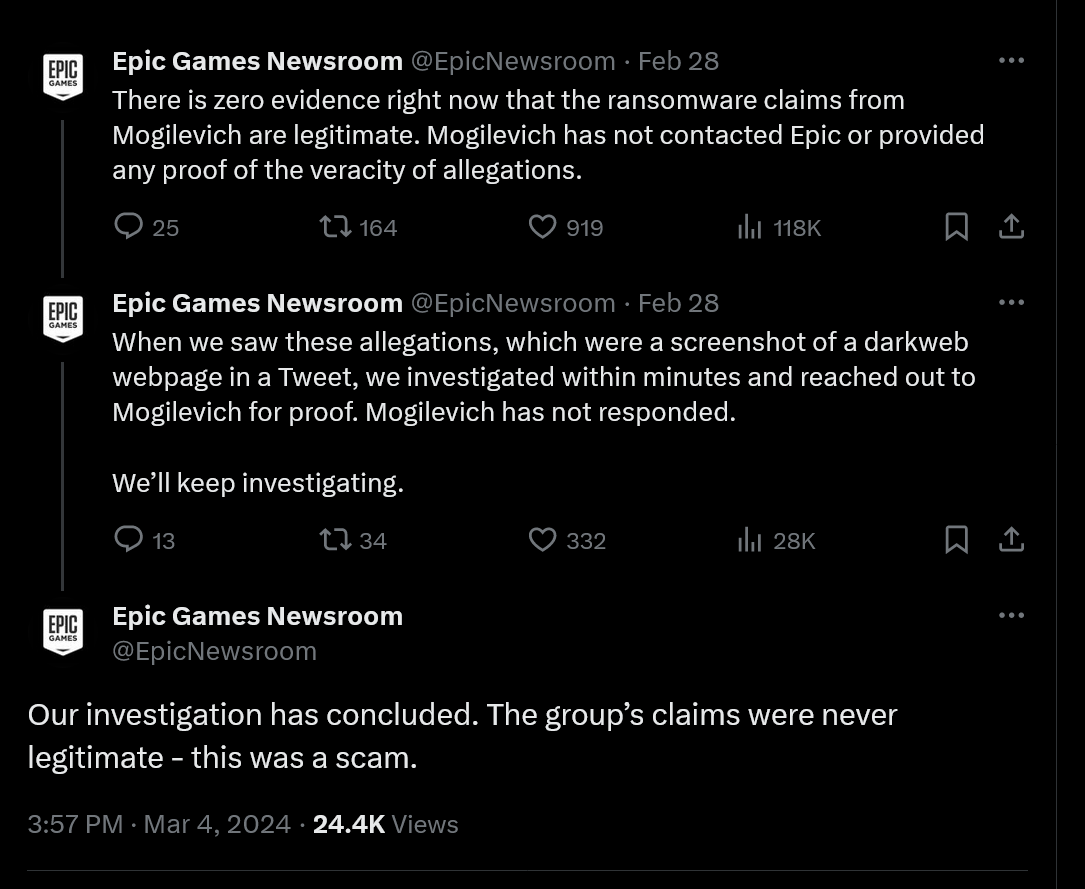[ad_1]
Following a report final week of a ransomware assault on Epic Video games that allegedly made off with practically 200GB of information, Epic now says the entire thing was the truth is “a scam“—and so does the group that claimed credit score for it within the first place.
The assault, reported on February 28 by Cyber Day by day, was supposedly carried out by a hacking group calling itself Mogilevich, presumably adopting the title of infamous Russian crime boss Semion Mogilevich. The group mentioned it had obtained 189GB of information within the assault, together with “e mail, passwords, full title, fee data, supply code and lots of different information,” and was providing it on the market, with a pay-up deadline of March 4.
The entire thing appeared a bit suspicious from the outset: No particular ransom quantity was set, nor was any proof supplied that the hack had really taken place, which is pretty customary follow for this kind of factor. For its half, Epic mentioned there was “zero evidence” the declare was respectable, and that its efforts to contact Mogilevich had gone unanswered.
Certain sufficient, when the ransom deadline arrived Mogilevich admitted that the entire thing was a rip-off: A brand new Cyber Day by day report says a hyperlink that purportedly contained the stolen Epic information as an alternative led to a message promoting the group’s providers as “skilled fraudsters.”
“Not one of the databases listed in our weblog have been as true as you might need found just lately,” a consultant of the group calling themselves Pongo wrote. “We took benefit of huge names to achieve visibility as rapidly as doable, however to not [gain] fame and obtain approval, however to construct meticulously our new trafficking of victims to rip-off.”
The message explains how Mogilevich used faux claims of hacks and “social engineering” to extract ever-increasing sums from victims, starting with gross sales of its hacking providers (which did not really exist) to eight individuals for $1,000 every—an quantity that was boosted to $2,000 every as soon as they agreed to pay—and ultimately resulting in what Mogilevich claimed was an $85,000 fee for supplies taken in a hack of drone maker DJI, though the group has once more supplied no proof that the payoff really occurred.
However now the jig is up: Migolevich has confessed to the true nature of its crimes, and Epic has confirmed that it was not hacked.
“Our investigation has concluded,” Epic tweeted. “The group’s claims have been by no means respectable – this was a rip-off.”

As for why the hacker-fraudsters spilled the beans in any respect, it seems to be a case of the traditional villain flaw: Mogilevich desires to brag.
“This was executed for example the method of our rip-off,” Pongo wrote. “We do not consider ourselves as hackers however relatively as legal geniuses, in the event you can name us that.
Pongo added that they consider they’ve “taught lots of people, particularly Epic Video games, a lesson” that reviews of hacks and ransom claims really had the alternative of the meant impact: They in the end did “nothing [more] than promote us by enlarging our fraudulent community.”
After all, as Cyber Day by day famous, none of that rationale is verifiable, and it is also doable that Mogilevich knew Epic wasn’t going to play ball and determined to stake a little bit declare to fame whereas it nonetheless might. Regardless of the purpose, and nevertheless many individuals have been really taken for a experience by this rip-off, it is yet one more reminder to watch out on the market: Because the Russians prefer to say, belief, however confirm.
[ad_2]
Source link


